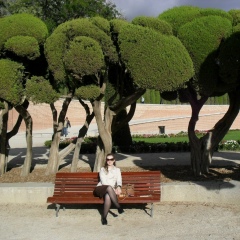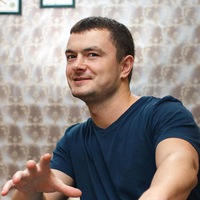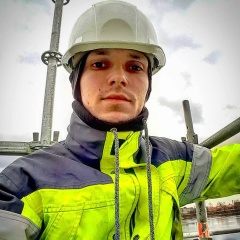Потрясающее пространство и на высочайшем уровне семинар. Посвящён он базовой работе с телом во время фасилитации дышащих, но, по сути, это правила и основы близости между любыми людьми.
Основной принцип: как только интенсивность опыта в практике достигает интенсивности полученной травмы, происходит исцеление. И это действительно тот принцип, по которому я делаю всю свою работу, оставаясь и усиливая каждое своё проживание в жизни вместо того, чтобы избегать его. Это направление и задаёт наш внутренний целитель.
Мне подумалось, что в связи с этим, большинство людей в реальной жизни находятся где-то на пути к исцелению, проходя через любые стрессовые и болезненные ситуации, так как таков запрос их души на терапию жизнью.
И именно поэтому каждый человек-это тот же дышащий, уязвимый и ищущий просвет в своей травме. И отношение к нему должно быть соответствующее.
Что больше всего зацепило меня из правил: если вы случайно задели дышащего или доставили ему дискомфорт, самым дерьмовым, что вы можете сказать ему, это: "да, это часть опыта твоей практики, прими его и проживи. Это что-то про тебя". Это полная чушь, говорит Диана (привет всем эзотерикам-абьюзерам). То, что вы обязаны сделать в этой ситуации-извиниться. Искренне принести извинения. Всегда.
Не нужно стоять над человеком, это неуважение (позиция сверху). Подходим мы всегда на корточках, медленно, оказываясь на одном уровне с человеком (привет комментаторам в белых пальто).
Если человек находится в состояниях разочарования, злости, раздражения, мы ни в коем случае не заходим к нему фронтально, лицом к лицу, так как это-проявление агрессии с нашей стороны. И, главное-мы не трогаем его. Вообще. Подходить можно только сбоку и дальше-лишь быть рядом, показывая свою открытость. В этот момент Диана продемонстрировала, как неуместно в таком случае обнимать человека и активно ему улыбаться (и здесь привет всем безусловно "любящим" и раскрывающим своё сердце, трогающим и зовущим в мгновенное хорошее настроение и...любовь, когда человеку при этом паршиво).
Ну и классика: если мне не нравится один из фасилитаторов, то велика вероятность, что я что-то спроецировала на него. Диана говорит: "Вы не настолько хорошо меня знаете, чтобы любить или ненавидеть. Мы не спим в одной постели". И это относится ко всем интенсивным чувствам с первого взгляда. В большинстве своём это наши внутренние переживания, наложенные на малознакомого человека.
Одно из самых важных правил наравне с безопасностью. Наша задача как фасилитаторов, по сути, убраться с пути дышащих и их истории и опыта. Не мешать. Внутренний целитель человека гораздо мудрее, креативнее и мощнее, чем любые мысли, способности и предположения окружающих людей (привет, спасатель). Даже профессионалов. Доверие целителю другого человека-это то, о чём молится хороший фасилитатор.
Мы почти два дня говорим только о правилах. И для меня это очень качественный новый опыт, расставляющий многие мои личные наработки по полочкам.
Основной принцип: как только интенсивность опыта в практике достигает интенсивности полученной травмы, происходит исцеление. И это действительно тот принцип, по которому я делаю всю свою работу, оставаясь и усиливая каждое своё проживание в жизни вместо того, чтобы избегать его. Это направление и задаёт наш внутренний целитель.
Мне подумалось, что в связи с этим, большинство людей в реальной жизни находятся где-то на пути к исцелению, проходя через любые стрессовые и болезненные ситуации, так как таков запрос их души на терапию жизнью.
И именно поэтому каждый человек-это тот же дышащий, уязвимый и ищущий просвет в своей травме. И отношение к нему должно быть соответствующее.
Что больше всего зацепило меня из правил: если вы случайно задели дышащего или доставили ему дискомфорт, самым дерьмовым, что вы можете сказать ему, это: "да, это часть опыта твоей практики, прими его и проживи. Это что-то про тебя". Это полная чушь, говорит Диана (привет всем эзотерикам-абьюзерам). То, что вы обязаны сделать в этой ситуации-извиниться. Искренне принести извинения. Всегда.
Не нужно стоять над человеком, это неуважение (позиция сверху). Подходим мы всегда на корточках, медленно, оказываясь на одном уровне с человеком (привет комментаторам в белых пальто).
Если человек находится в состояниях разочарования, злости, раздражения, мы ни в коем случае не заходим к нему фронтально, лицом к лицу, так как это-проявление агрессии с нашей стороны. И, главное-мы не трогаем его. Вообще. Подходить можно только сбоку и дальше-лишь быть рядом, показывая свою открытость. В этот момент Диана продемонстрировала, как неуместно в таком случае обнимать человека и активно ему улыбаться (и здесь привет всем безусловно "любящим" и раскрывающим своё сердце, трогающим и зовущим в мгновенное хорошее настроение и...любовь, когда человеку при этом паршиво).
Ну и классика: если мне не нравится один из фасилитаторов, то велика вероятность, что я что-то спроецировала на него. Диана говорит: "Вы не настолько хорошо меня знаете, чтобы любить или ненавидеть. Мы не спим в одной постели". И это относится ко всем интенсивным чувствам с первого взгляда. В большинстве своём это наши внутренние переживания, наложенные на малознакомого человека.
Одно из самых важных правил наравне с безопасностью. Наша задача как фасилитаторов, по сути, убраться с пути дышащих и их истории и опыта. Не мешать. Внутренний целитель человека гораздо мудрее, креативнее и мощнее, чем любые мысли, способности и предположения окружающих людей (привет, спасатель). Даже профессионалов. Доверие целителю другого человека-это то, о чём молится хороший фасилитатор.
Мы почти два дня говорим только о правилах. И для меня это очень качественный новый опыт, расставляющий многие мои личные наработки по полочкам.
A stunning space and a top notch workshop. It is dedicated to basic work with the body during the facilitation of breathers, but, in fact, these are the rules and foundations of intimacy between any people.
The basic principle is that as soon as the intensity of the experience in the practice reaches the intensity of the trauma received, healing occurs. And this is really the principle by which I do all my work, staying and strengthening my every experience in life instead of avoiding it. This direction is set by our inner healer.
I thought that in this regard, most people in real life are somewhere on the path to healing, going through any stressful and painful situations, since this is the request of their souls for life therapy.
And that is why each person is the same breathing, vulnerable and looking for a gap in their trauma. And the attitude towards him should be appropriate.
What hooked me the most about the rules: if you accidentally hit a breather or make him uncomfortable, the shittiest thing you can tell him is: "yes, this is part of your practice experience, take it and live it. This is something about you." ... This is complete nonsense, says Diana (hello to all esoteric abuser). What you must do in this situation is to apologize. Apologize sincerely. Is always.
There is no need to stand over a person, this is disrespect (position from above). We always approach squatting, slowly, finding ourselves on the same level with a person (hello to commentators in white coats).
If a person is in states of disappointment, anger, irritation, we in no case go to him frontally, face to face, since this is a manifestation of aggression on our part. And, most importantly, we do not touch him. At all. You can only approach from the side and then just be there, showing your openness. At this moment, Diana demonstrated how inappropriate in this case to hug a person and actively smile at him (and here hello to everyone who is definitely "loving" and opening his heart, touching and calling in an instant good mood and ... love, when the person is lousy at the same time) ...
Well, the classic: if I don't like one of the facilitators, then there is a high probability that I projected something onto him. Diana says: "You don't know me well enough to love or hate me. We don't sleep in the same bed." And this applies to all intense feelings at first sight. For the most part, these are our inner experiences superimposed on an unfamiliar person.
One of the most important rules along with safety. Our job as facilitators is essentially to get out of the way of the breathers and their stories and experiences. Do not interfere. A person's inner healer is much wiser, more creative and more powerful than any thoughts, abilities and assumptions of the people around him (hello, rescuer). Even professionals. Trusting another person's healer is something a good facilitator prays for.
We've only been talking about rules for almost two days. And for me this is a very high-quality new experience that puts many of my personal achievements on the shelves.
The basic principle is that as soon as the intensity of the experience in the practice reaches the intensity of the trauma received, healing occurs. And this is really the principle by which I do all my work, staying and strengthening my every experience in life instead of avoiding it. This direction is set by our inner healer.
I thought that in this regard, most people in real life are somewhere on the path to healing, going through any stressful and painful situations, since this is the request of their souls for life therapy.
And that is why each person is the same breathing, vulnerable and looking for a gap in their trauma. And the attitude towards him should be appropriate.
What hooked me the most about the rules: if you accidentally hit a breather or make him uncomfortable, the shittiest thing you can tell him is: "yes, this is part of your practice experience, take it and live it. This is something about you." ... This is complete nonsense, says Diana (hello to all esoteric abuser). What you must do in this situation is to apologize. Apologize sincerely. Is always.
There is no need to stand over a person, this is disrespect (position from above). We always approach squatting, slowly, finding ourselves on the same level with a person (hello to commentators in white coats).
If a person is in states of disappointment, anger, irritation, we in no case go to him frontally, face to face, since this is a manifestation of aggression on our part. And, most importantly, we do not touch him. At all. You can only approach from the side and then just be there, showing your openness. At this moment, Diana demonstrated how inappropriate in this case to hug a person and actively smile at him (and here hello to everyone who is definitely "loving" and opening his heart, touching and calling in an instant good mood and ... love, when the person is lousy at the same time) ...
Well, the classic: if I don't like one of the facilitators, then there is a high probability that I projected something onto him. Diana says: "You don't know me well enough to love or hate me. We don't sleep in the same bed." And this applies to all intense feelings at first sight. For the most part, these are our inner experiences superimposed on an unfamiliar person.
One of the most important rules along with safety. Our job as facilitators is essentially to get out of the way of the breathers and their stories and experiences. Do not interfere. A person's inner healer is much wiser, more creative and more powerful than any thoughts, abilities and assumptions of the people around him (hello, rescuer). Even professionals. Trusting another person's healer is something a good facilitator prays for.
We've only been talking about rules for almost two days. And for me this is a very high-quality new experience that puts many of my personal achievements on the shelves.

У записи 96 лайков,
1 репостов,
2336 просмотров.
1 репостов,
2336 просмотров.
Эту запись оставил(а) на своей стене Ольга Цветкова






































































